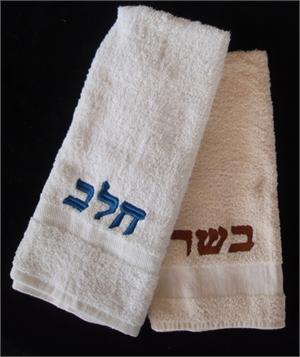A recent Jewish Week article, “A Woman’s Place is in the (Kosher) Kitchen” by Amy Spiro caught plenty of attention. When Donyel Meese, a pre-med undergraduate and NCSY alumnus, was offered student employment in kashrut supervision (Ohio State University’s Hillel Cafe), she first consulted her Rabbi regarding halachic issues. It’s a common misconception that a “mashgiach” must be male, or even a rabbi for that matter.
Although it’s still a relatively rare phenomenon, professional training for female kashrut supervisors is on the rise. According to Rabbi Moshe Elefant, COO of the OU’s Kashrut Department, the biggest challenge is, “The need to be extremely flexible and being available to go where you’re needed. Sometimes people aren’t that available to leave their families…”
In any case, a woman’s place is no longer limited to the household kitchen, even if she’s not a professional kashrut supervisor. Back by popular demand, the Harry H. Beren ASK OU program is once again offering its Advanced Kashrut Seminar for Women, August 29 – September 2 at OU headquarters. The program is not specifically designed for mashgichot, but rather for women interested in a higher level of kashrut awareness.
In addition to classes, and as part of the field work, participants in this year’s seminar will have the opportunity to observe finer points of kosher law in an on-site commercial setting. The Sheraton Meadowlands (New Jersey) is opening its facility to this year’s group; participants will tour the hotel kitchen, where kosher meals are prepared for hundreds of people simultaneously.
When the Orthodox Union first piloted this particular program in 2009, the reception was overwhelming; registration quickly reached maximum capacity, but more significantly, participants represented a wide diversity of backgrounds. According to a follow up article featured in the Five Towns Jewish Times, the professional credentials of attendees included a clinical psychologist, an MD who had recently married a rabbi, several school teachers and graduate students, a trained chef, a food scientist, and an OU Kosher staff member who used vacation time to attend. Participants came from far and wide and represented a broad spectrum of religious observance.
There was unanimous agreement among the woman that the seminar had encompassed a broad scope of information, in-depth classes, interesting field trips, and dynamic teachers who answered all questions with both patience and candor.
Rabbi Yosef Grossman, the OU’s director of kosher education and the coordinator of the seminar, explained “It was most gratifying to be able to coordinate the Advanced Kashrut Seminar for Women on behalf of the OU. Our participants ranged from near and far; from Edmonton, Canada, to Efrat, Israel, to Melbourne, Australia. They represented a broad spectrum of Orthodoxy, from modern orthodoxy to Satmar. We at the OU take great pleasure in the fact that we were able to offer an advanced, in-depth course which met the diverse kosher educational needs of our participants.”
Rabbi Steven Weil, senior managing director, has often pointed out, “At the Orthodox Union, what we do is kashrut for the sake of kashrut, providing the highest standard without the profit motive.” Rabbi Weil noted that the revenues of OU Kosher go to fund a large variety of programs worldwide, such as NCSY, the OU’s international youth organization; the Job Board; synagogue and community services; educational services; the Jewish Life on Campus Initiative (JLIC); and Yachad/Our Way, the National Jewish Council for Disabilities.
Rabbi Menachem Genack, chief executive officer of OU Kosher, added to the sentiment, “OU Kosher is constantly expanding its horizons in terms of the educational programs it offers to the community. The Advanced Kashrut Program for women satisfied a very real need and attracted a wide variety of participants.”
Phyllis Koegel, the OU Kosher’s Marketing Director who plays an international role promoting OU kosher certification, noted “Women participating in the OU kashrut seminar are all extremely well-learned and take this course very seriously. The extent of their knowledge, made evident by their penetrating questions and incisive comments, impressed me a great deal.”
This year’s coursework will feature a faculty of OU experts and lectures on a wide variety of kashrut aspects in the home kitchen as well as industrial plant and hotel kitchen tours. Topics include: checking vegetables for insects; finding blood spots in eggs; meat and dairy control; identifying and purchasing kosher fish; methods of food service and industrial kosherization; and general questions on Jewish laws of kashrut.
The words of this author reflect his/her own opinions and do not necessarily represent the official position of the Orthodox Union.



